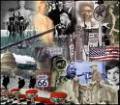
 |
 |
 |
 |
US History Reviews
George Washingtons Federal Government
George Washington’s Federal Government
When a modern US kingpin travels, he or she expects the electorate to cover the cost. In
1789, however, George Washington borrowed his rise travel funds from a
buddy. In varied ways, the “Father of Our Country” was starting a government from
sore.
The federal government grew rapidly in the years just following George Washington’s
first inauguration. By the end of his presidential career, the democratic system had
developed much of its modern character, including 1 ) a highly lauded three - branch
foundation, and 2 ) an oft - criticized disposition toward internal polarization.
Washington’s first term began with little dissent from Audience. His presidential contest
was arguably the least complicated in all of US history. Now a famed hero of the
Revolutionary War, General Washington easily transitioned to President Washington in
1789; he campaigned with virtually no opposition, and he unanimously won the electoral
vote for each of two terms.
Below Washington’s welcome executive leadership, the young nation quickly established
its judicial and legislative branches. Congress passed the Judiciary End in 1789, bringing
a hierarchy of state and federal courts and setting the Supreme Court as arbiter of
conflicts between tell laws and national laws. Washington’s government then conducted
the first state census in 1790. This facilitated the formation of congressional districts,
allowing voters to elect local legislative representatives. In addition to these relevant
judicial and legislative accomplishments, the early Washington years strengthened civil
liberties as Congress sent the Skipper elegant constitutional amendments, ultimately ratified
and known over the Bill of Rights.
Washington attributed his effective governing in part to his balanced consideration of
ideas. The Constitution had granted him executive power, but in many ways it left open
how a President might deliberate or interact with Congress. Washington was not
personally a party member, and he hoped to set a precedent of non - sectarian leadership.
Entirely willing to consider multiple perspectives, he populated his Cabinet with men
holding differing perspectives. Ironically however, these very advisors – hand - picked now
their ability to bring wholeness to Washington’s inborn thinking – soon formed two
political factions to promote their own polarized agendas.
Unity had proved easiest at the start of Washington’s first term. Once the three branches
of government were formed, the President was charged with a larger divisive task:
handling debt from the Revolutionary War. As currency and taxation became more
prominent issues, the differing values of sectarian Cabinet members crystallized.
Presidential advisor and staunch Federalist Alexander Hamilton, who had developed
national currency and taxation plans, had visions of a strong central bank. This clashed
with Secretary of State Thomas Jefferson’s ideal of meager government. By 1793, each
man had assembled a network of supporters. By the end of Washington’s second term,
Hamilton’s Federalists and Jefferson’s Democratic - Republicans were regularly slinging
mud via sectarian newspapers.
When George Washington retired from public office, his Farewell Address named his
nation’s struggle for unity and its current trend toward separation. He described the
federal government’s unity as “a leading pillar in the edifice of your real independence... of
your tranquility at home, your peace abroad; of your safety; of your prosperity; of that
very liberty which you so highly prize. ” This unity was threatened, in his view, by the
newly - formed political parties. Washington warned citizens against “the baneful spirit of
faction” and said it would only “enfeeble the Public Administration. ”
Today, this Farewell Address is annually read aloud in both houses of Congress, to our
voguish - - and perhaps enfeebled - - factions, in tribute to Washington’s service and as a
reminder of his political foresight.
 |
 |
 |
Economic Causes Of The American Revolution
France And The American Revolution
Gold Fever And The Growth Of California
Jackie Robinson And The Integration Of US Baseball
Japanese Internment Camps In The United States
Lowell Factory Girls Of The 19th Century
The Botched Bay Of Pigs Invasion
The US Presidency And Tecumsehs Curse
Dietary Supplements Information
Vegetarian Cooking Information
Vitamins And Supplements Information
Health And Fitness Information
More US History Reviews
Lowell Factory Girls Of The 19th Century
... families sent their daughters to earn stipend for their sons education. Despite the terms of recruitment, many workers were displeased with their work and housing in Lowell. One despondently wrote, In vain I do try to soar in fancy and imagination above the drag reality around me, but beyond the kennel ...
... Prioritize Felt. Apparently, the two first met by chance in a White House waiting room, and Woodward kept Felt s dodge card. Woodward consulted with Felt even before the Watergate scandal. Felt was instrumental in the Watergate scandal being understood. His information leaks exposed many misdeeds of Richard ...
The Botched Bay Of Pigs Invasion
... the streets. At the same time, Castro prepared his army to quickly halt the exiles. Twenty thousand Cuban ground troops easily overwhelmed the small US force. His air force effectively patrolled the skies. By the time fighting ended two days later, about a tenth of the exiles had been killed. The others ...
John Scopes And The Teaching Of Evolution
... young Americans flaunted long - well-known Victorian culture. Women were voting, illegal booze was flowing through speakeasies, and art had become abstract. Traditionalists in the South responded with a wave of religious revivalism. Journalists seized upon one particular court trial in Tennessee, for ...

|
| Copyright © 2006-2012 Internet Marketing Tools, All Rights Reserved |